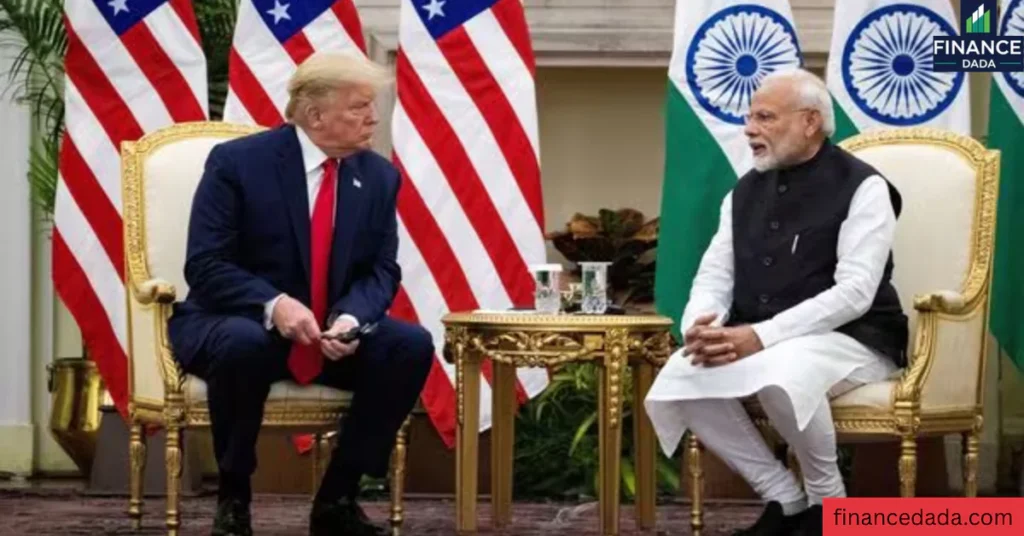India-US Trade Deal: Expectations for Indian Stock Market as Tariff Deadline Nears
India-US Trade Deal: The Indian stock market is navigating a phase of consolidation as investors closely monitor developments in the India-US trade negotiations, with the 90-day tariff pause set to expire on July 9, 2025. Despite recent volatility, the Nifty 50 breached the key resistance level of 25,350 last week, signaling a breakout. However, market experts warn that the looming tariff deadline could introduce indirect challenges due to global trade uncertainties.

Market Dynamics and Trade Talks
The Indian stock market has been rangebound, with the Nifty fluctuating between 24,800 and 25,660. On Friday, July 4, 2025, the Nifty closed at 25,461, up 0.22%, while the Sensex ended at 83,432.89, gaining 0.23%. This followed a volatile session driven by value buying in IT and banking stocks, alongside optimism about a potential interim trade deal with the US.
India and the US are in the final stages of negotiating an interim Bilateral Trade Agreement (BTA), with an announcement expected before July 8. The deal aims to avoid a 26% reciprocal tariff on Indian exports, which was announced by the Trump administration on April 2 and paused for 90 days. A key breakthrough involves excluding agriculture and dairy from the agreement, addressing India’s long-standing concerns. Indian negotiators are pushing for tariff concessions in labour-intensive sectors like textiles, footwear, and leather to boost exports.
Potential Market Impact
A successful trade deal could uplift market sentiment, particularly for export-driven sectors. Analysts highlight that pharmaceuticals, IT, and specialty chemicals could benefit significantly if tariff hikes are avoided. For instance, a deal sparing pharmaceutical exports could trigger a sector rally, as noted by VK Vijayakumar, Chief Investment Strategist at Geojit Financial Services. Conversely, failure to secure an agreement may lead to a 26% tariff, impacting companies like Welspun Living, which derives 63% of its revenue from the US.
However, experts caution that the rally may not be sustained without strong corporate earnings. Q1 FY26 results, expected soon, will be critical, with management commentary likely to influence market direction more than raw numbers. Sectors like financials, banking, and two-wheelers are expected to remain resilient, while domestic consumption themes like telecom and hospitality face valuation challenges.
Global and Domestic Headwinds
The uncertainty surrounding the trade deal coincides with other pressures. SEBI’s recent ban on Jane Street Group for alleged index manipulation has dampened market confidence. Additionally, global trade tensions, including potential US tariffs of up to 70% on other nations, are contributing to investor caution. The Indian rupee slipped slightly, but volatility expectations remain low, suggesting markets are not yet pricing in sharp swings.
India’s firm stance, led by Commerce Minister Piyush Goyal, emphasizes national interest over rushed deadlines. India is seeking duty concessions for textiles and auto parts while resisting US demands for access to its agriculture and dairy markets. The US has also dismissed immediate zero-tariff proposals, complicating negotiations.
Strategic Outlook for Investors
Market experts recommend a cautious approach. Vinod Nair of Geojit Investments suggests focusing on value buying in fundamentally strong sectors like IT and banking, which showed resilience on Friday. However, with Nifty trading at elevated valuations, significant earnings growth is essential for a sustained breakout. Investors are advised to adopt a wait-and-watch strategy, balancing optimism about a potential trade deal with vigilance over global cues and Q1 results.
If the interim deal is finalized, Indian exports could double within three years, according to the Federation of Indian Export Organisations. Alternative markets like the UK and EU, where India is pursuing FTAs, could also cushion any adverse tariff impacts.
Conclusion: India-US Trade Deal
The India-US trade deal remains a pivotal factor for the Indian stock market as the July 9 deadline approaches. A favorable outcome could unlock opportunities for export-oriented sectors, but uncertainties and high valuations warrant caution. Investors should focus on companies with strong fundamentals and monitor Q1 FY26 earnings for clearer market direction.
Disclaimer: This article is for informational purposes only and does not constitute investment advice. Stock market investments are subject to risks. Consult a certified financial advisor before making investment decisions.
Also Read: ONGC Share Price Target & Forecast 2025–2030: A Stable PSU Investment?









